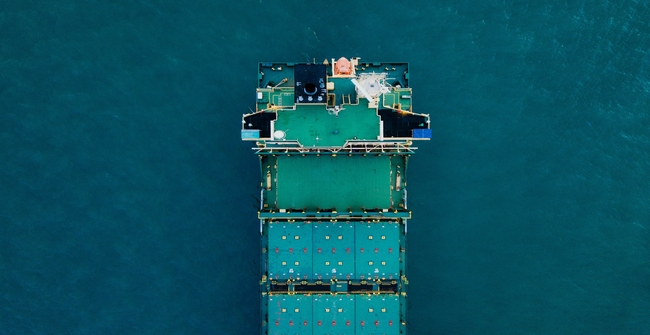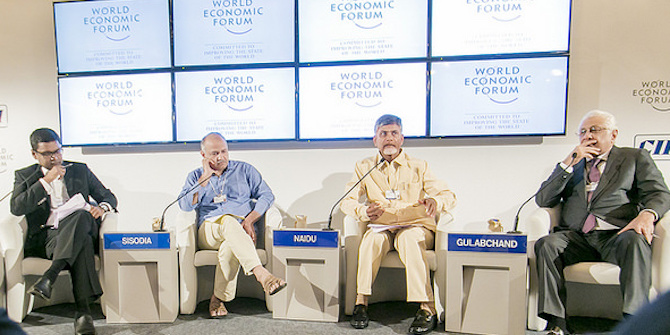Sri Lanka’s ports are at the heart of China’s Belt Road Initiative. With the Shanghai Cooperation Organisation following China’s foreign policy direction, Natasha Fernando (INSSSL) asks if Sri Lanka’s ‘dialogue partner’ status is enough to allow the country to benefit from the intergovernmental organisation’s focus on security and economic development while maintaining its position of non-alignment.
 Photo: Cargo Ship | Credit: @chuttersnap, Unsplash
Photo: Cargo Ship | Credit: @chuttersnap, Unsplash
The Shanghai Cooperation Organisation (SCO) initially set up as an ad-hoc intergovernmental organisation to address the economic and security concerns in the aftermath of Soviet disintegration has eight members: Kazakhstan, China, the Kyrgyz Republic, the Russian Federation, Tajikistan, Uzbekistan, India and Pakistan. Comprising of four observer states (Afghanistan, Belarus, Iran and Mongolia), it also has six ‘dialogue partners’, of which one is Sri Lanka.
Today however the organisation is mainly used by China and Russia to balance and coordinate their interests in the Central Asian Region. A 2018 study on the SCO by the Institute for Security Studies identified the SCO not as a regional integration project, but one with a distinct multilateral character that advocates ‘open regionalism’, (the attempt to maintain regional and global trading relationships) aimed at stabilising the central Asia region. The body’s approach, according to the study, is to engage in a “competitive complementarity” with mandates and memberships that overlap with other regional organisations.
Security cooperation
The security cooperation arm of the SCO focuses on non-traditional security threats, fighting against “three evils”: terrorism, separatism and extremism. Through a series of agreements, the organisation works to act in accordance with universally recognised principles, norms, international law, state sovereignty and territorial integrity. The idea of the SCO emerging as a security community remains wishful thinking. The main idea of such a community revolves around concepts of collective identities, shared values and similar understandings of the perception of threats. An unorthodox example is cooperation on counter-terrorism. The Shanghai Convention on Combatting Terrorism has a broad definition of what constitutes a terrorist act and measures to be taken by parties. This has been subject of severe criticism however by human rights activists as a deviation from international standards.
The SCO expansion to include India and Pakistan tests the attempt to build this security-focused community. Fighting terrorism has been an arrangement made between China and Pakistan, which is considered a threat to the China-Pakistan economic corridor project. Through the SCO it remains to be seen whether counter-terrorism could emerge as convergent points between China, India and Pakistan irrespective of Sino-Indian or Indo-Pakistan threat perceptions.
China’s Belt and Road Initiative
A recent Institute for Security Studies paper highlighted that SCO cooperation largely follows Chinese foreign policy, a fact, not in appearance at least, that is in competition with Russia’s. The two states have similarities, including elective dictatorships, and complementary interests in the Eurasian Region and Central Asia. China has actively invested in Pakistan and Afghanistan in infrastructure development, such as roads and railways. Kazakhstan, Kyrgyzstan, Turkmenistan are also recipients of investments from China in the energy sector. The transport routes of the Belt Road Initiative are located through Central Asia and Eurasian states, which are based on systemic interconnected infrastructure and network communications.
Several policy groups have raised the concern that the SCO might be being used as a bulwark against US expansion in the region, with the Belt Road Initiative reinforcing this agenda. If the US were to remove troops from Syria and Afghanistan, the line of analysis goes, China and Russia would lead the eastern part of the world. The Belt Road Initiative, with both land and maritime dimensions, places China in an influential position therefore in the SCO.
Sri Lanka’s role
As the SCO largely follows the direction of China’s foreign policy with member states that are part of the Belt Road Initiative, Sri Lanka, as a dialogue partner is an important part of the Belt Road Initiative and therefore the SCO. The strategic investments on Colombo Port City and Hambantota Harbour are located amongst crucial sea lanes of communication and shipping routes. At the High Level Conference of the Shanghai Cooperation Organisation on ‘Security and Stability in the Region of SCO’ in 2015, the Sri Lankan representative welcomed the security cooperation orientation of the organisation, asserting Sri Lanka is a trans-shipment hub for trafficking of drugs, people and other contraband.
Sri Lanka in 2013 signed a Memorandum of Understanding among Member States, Observers and Dialogue Partners of Shanghai Cooperation Organisation (SCO) on the Creation of an Energy Club. Bilateral level discussions also took place in 2016 between Tajikistan and Sri Lanka on cooperation in various miscellaneous matters including, trade, investment and security. Even strengthening the judiciary was a part of Sri Lanka-SCO relations, as witnessed by the Chief Justice’s visit to Beijing in 2018 for Conference of the Presidents of Supreme Courts of Shanghai Cooperation Organisation. Currently Russia is looking to cooperate with Sri Lanka on providing nuclear energy which has the potential to be regulated through the SCO which has a broad understanding on creating a collective energy security policy.
Beyond ‘dialogue partner’ status
The SCO as a multilateral experiment offers promise in remaining valid and relevant for the years to come. The organisation is unique: it has a diverse, yet powerful membership connecting Central Asia and the Eurasian region while also fitting within China’s Belt Road Initiative.
To gain the benefits from the organisation in trade, investment and energy, Sri Lanka however is faced with challenges as it grapples with a foreign policy stance of non-alignment. Could the policy of non-alignment be reconciled with joining an organisation that has strong security-oriented rhetoric? Furthermore, the debt owed to China, and the considerable involvement of China in Sri Lanka, India’s influence in Sri Lanka and the potential future involvement of Russia providing nuclear energy, all presents the country will a diverse set of foreign powers to balance. It remains to be seen how far Sri Lanka could prioritise its partnership with SCO and help manage these evolving relations if its cooperation remains only at the status of a ‘dialogue partner’.
This article gives the views of the author, and not the position of the South Asia @ LSE blog, nor of the London School of Economics. Please read our comments policy before posting.
Natasha Fernando is a Research Assistant at the Institute of National Security Studies Sri Lanka (INSSSL), a think tank of the Ministry of Defense. This article does not reflect the stance of the government of Sri Lanka or INSSSL. The opinions are author’s own. Natasha holds a Bachelor of Law and Bachelors in International Studies from the University of Kelaniya







